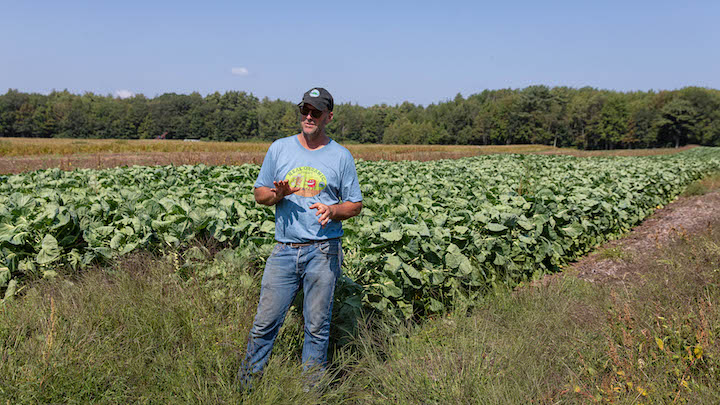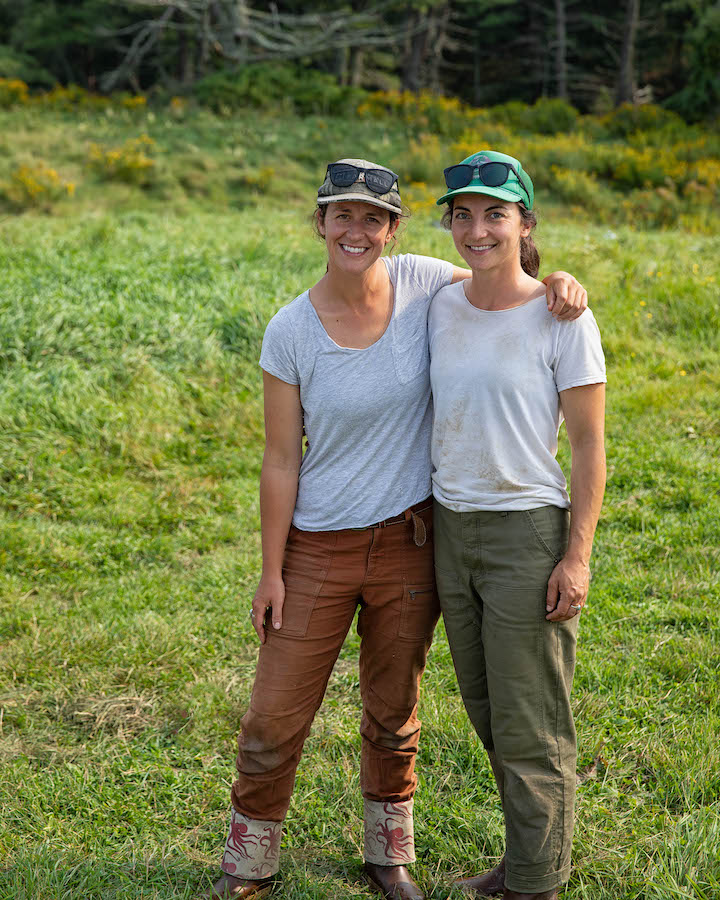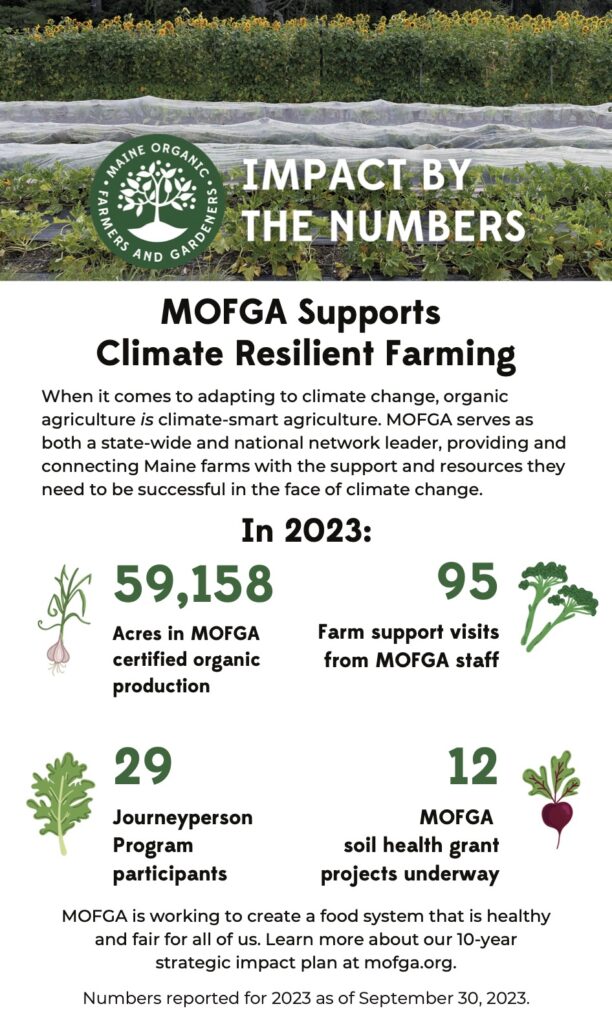When it comes to adapting to climate change, organic agriculture is climate-smart agriculture. This has been a difficult year for many farms in Maine. A late May frost impacted fruit and vegetable growers across the region, and in June and July, Maine saw a combined 11 inches more rain than average. This was a stark contrast to the drought experienced across much of the state last year. Weather extremes like heavy rain, strong storms and drought are going to continue to challenge Maine farms as the impacts of climate change worsen. Farmers are seeking strategies to adapt to the impacts of extreme weather so that their businesses remain viable and they can continue feeding our communities.
The growing practices that have long been hallmarks of organic farming — practices that focus on building healthy soils and preserving biodiversity — help farms to be more resilient in the face of unpredictable weather conditions. MOFGA serves as both a state-wide and national network leader, providing and connecting Maine farms with the support and resources they need to be successful in the face of climate change.
We visited two farms this fall, Crystal Spring Farm and Sound Pine Farm, to hear about how the impacts of climate change are affecting their farms and how MOFGA is helping them address these challenges.
Seth Kroeck (he/him) — Crystal Spring Farm, Brunswick
Seth Kroeck is celebrating his 20th season farming at Crystal Spring Farm in Brunswick, and he joined MOFGA’s board of directors in 2023. Kroeck has acutely felt the impacts of extreme weather this year. He lost his entire 36-acre organic blueberry crop to a 26-degree frost on May 18. Then, the unusually cold and wet summer led to increased disease and weed pressure in his 32 acres of vegetables, grains and mixed cover crops. “Our carrots this year are plagued by disease. We got 30-40% of our expected yield on our first crop of carrots,” says Kroeck.
When Kroeck faces challenging growing conditions, he reaches out to farming community members as well as to MOFGA’s organic crop specialists, Caleb Goossen and Mariam Taleb for guidance. “Caleb and Mariam are more than just pest experts. They have expertise in soil health, crops and rotations, and help me figure things out or connect me with other resources.”

Kroeck has made adaptations in his crop plans for pest management as climate change increases pest pressure. In Crystal Spring’s Brussels sprouts crop, he plants a row of sweet alyssum every several rows. Sweet alyssum plants harbor hover flies that parasitize cabbage aphids that can damage the Brussels sprouts crop. “I’m trying to create balance in an artificial environment,” says Kroeck, “and the need will continue to be greater in the future with extreme weather.”
As a new board member, Kroeck is gaining insight into how MOFGA works beyond what he previously experienced through the organization’s farmer programs and certification services. “MOFGA exists to support the people of Maine and the food system. That’s how the money gets spent — it’s going directly to support our community. As a finance committee member, it’s been interesting having an insider window to that,” he says.
Alessia McCobb (she/her) and Virginia Winkler (she/her) — Sound Pine Farm, Brunswick
Alessia McCobb and Virginia Winkler are also learning climate-smart growing practices with MOFGA’s help. Winkler moved to Maine in 2016 to be a MOFGA apprentice at Crystal Spring Farm, and McCobb joined her there the following season. After working together there and at other farms, in 2019, they started Sound Pine Farm in Brunswick.

“While working at other farms, climate change felt like a more distant threat. Between starting our own farm and the extremely wet conditions that first season, we realized that climate change is right now,” says Winkler.
As participants in MOFGA’s Journeyperson Program, McCobb and Winkler have been matched with farm mentors who helped guide new climate-smart systems to handle the wetter seasons they anticipate due to climate change. They established permanent crop beds to reduce the need to till during wet periods when fields are inaccessible by tractor. They also use silage tarps on their beds after flail mowing to terminate crops without tillage. They can use this method to maintain their permanent beds on wetter soil versus needing much dryer soil in order to till.
They appreciate the benefits of being a part of MOFGA and Maine’s farming community. “There’s so much support here for beginning farmers,” says McCobb. “There’s help at every turn. MOFGA either offers assistance directly or makes connections with other resources.”
For Sound Pine Farm, these resources have included networking with MOFGA staff and farms to find land for their farm, working with Land For Good to write their lease, and participating in the U.S. Department of Agriculture’s (USDA’s) Climate Adaptation Fellowship Program.

Supporting MOFGA’s Work and Together We Grow
The organic growing principles that MOFGA was founded on over 50 years ago are vital in the face of climate change. With your support, we can continue to help farms thrive, attract new farmers to Maine and encourage more farms to adopt organic, climate-smart practices.
We hope that you will consider making a year-end gift to fund this important programming. You can donate today by visiting mofga.org or by returning the form enclosed in this issue of The Maine Organic Farmer & Gardener.
In addition, we sincerely thank all of our devoted community members who increased their annual giving and made special gifts as part of our three-year 50th Anniversary Campaign: Together We Grow. Through many substantial community challenges (the COVID-19 pandemic and PFAS chemical contamination, just to name two!), MOFGA’s campaign —the organization’s largest capital campaign to date — has seen many twists and turns in its progress as we have willingly pivoted at each step to center the needs of our communities first and foremost. Currently, we have just over $800,000 remaining to raise toward our $12 million goal before December 31, 2023.
Over the past three years, we have made significant strides in bolstering MOFGA’s long-term financial sustainability — and we need your help to continue that critical momentum. If you would like to discuss a special end-of-campaign gift and help us cross the finish line of this pivotal campaign, please reach out to me at [email protected] or 207-505-5623.Thank you for being a part of ensuring MOFGA’s vibrant future creating a healthy and fair food system for all of us.
– Meghan Metzger, Director of Membership and Development
This article was originally published in the winter 2023-24 issue of The Maine Organic Farmer & Gardener.
